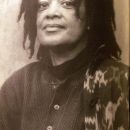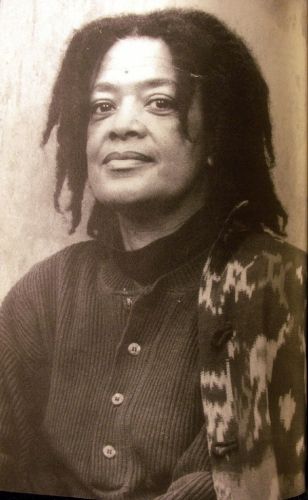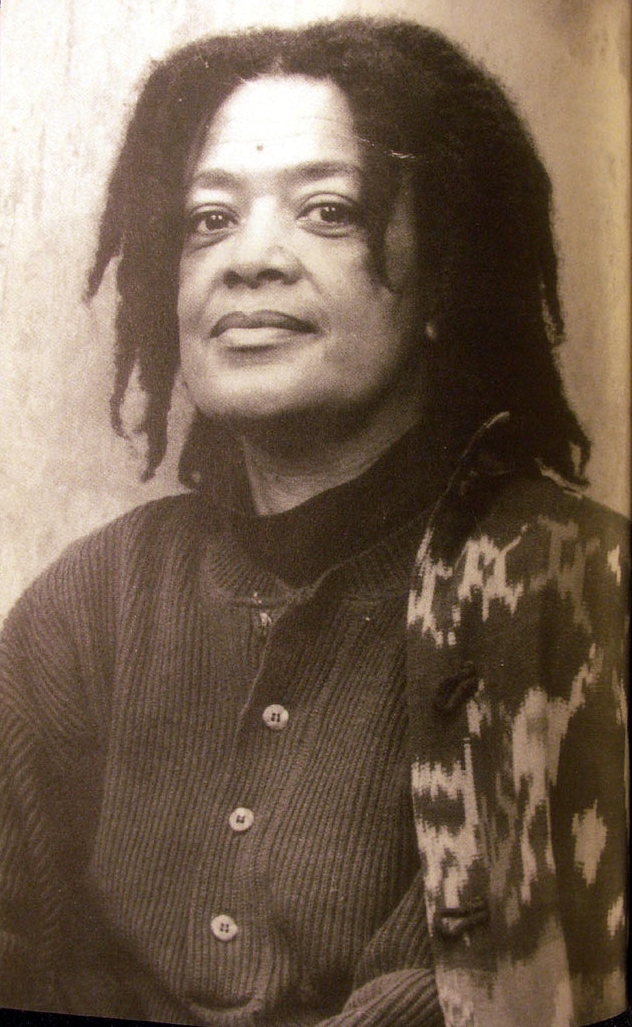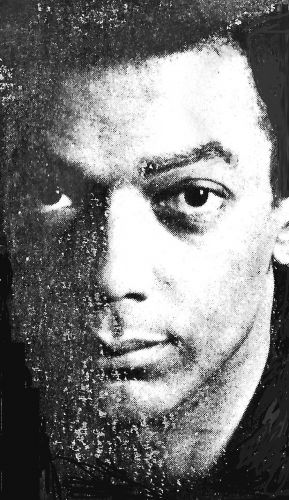Toni Cade Bambara
Born Miltona Mirkin Cade
March 25, 1939
New York City
Died December 9, 1995 (aged 56)
Philadelphia, Pennsylvania
Occupation writer, documentary-film maker, political activist, educator
Notable works "Blues Ain't No Mockin Bird"
Toni Cade Bambara, born Miltona Mirkin Cade[1] (March 25, 1939 – December 9, 1995),[2] was an African-American author, documentary film-maker, social activist and college professor.
Biography
Miltona Mirkin Cade was born in Harlem, New York, to parents Walter and Helen (Henderson) Cade. She grew up in Harlem, Bedford Stuyvesant (Brooklyn), Queens and New Jersey. At age 6, she changed her name from Miltona to Toni, and then in 1970 changed her name to include the name of a West African ethnic group, Bambara, after finding the name written on a sketchbook found in a trunk among her great-grandmother's other belongings.
Bambara graduated from Queens College with a B.A. in Theater Arts/English Literature in 1959,[1] then studied mime at the Ecole de Mime Etienne Decroux in Paris, France.She also became interested in dance before completing her master's degree at City College, New York in 1964, while serving as program director of Colony Settlement House in Brooklyn. She has also worked for New York social services and as a recreation director in the psychiatric ward of Metropolitan hospital. From 1965 to 1969 she was with City College's Search for Education, Elevation, Knowledge-program.[6] She taught English, published material and worked with SEEK's black theatre group. She was made assistant professor of English at Rutgers University's new Livingston College in 1969 and continued until 1974. She was also visiting professor in Afro-American Studies at Emory University and at Atlanta University (1977), where she also taught at the School of Social Work (until 1979). Bambara was writer-in-residence at Neighborhood Arts Center (1975–79), at Stephens College in Columbia, Missouri (1976) and at Atlanta's Spelman College (1978–79). From 1986 she taught film-script writing at Louis Massiah's Scribe Video Center in Philadelphia.
Bambara participated in several community and activist organizations, and her work was influenced by the Civil Rights and Black Nationalist movements of the 1960s. In the early to mid 1970s, she traveled to Cuba and Vietnam to study how women’s political organizations operated. She put these experiences into practice in the late 1970s after moving to Atlanta, Georgia with her daughter, Karma Bene, where Bambara co-founded the Southern Collective of African American Writers.[7][8]
Toni Cade Bambara was diagnosed with colon cancer in 1993 and died of it in 1995, at the age of 56 in Philadelphia, PA.
Writing
Bambara was active in the 1960s Black Arts movement and the emergence of black feminism. Her anthology The Black Woman (1970), with poetry, short stories, and essays by Nikki Giovanni, Audre Lorde, Alice Walker, Paule Marshall and herself, as well as work by Bambara's students from the SEEK program, was the first feminist collection to focus on African-American women. Tales and Stories for Black Folk (1971) contained work by Langston Hughes, Ernest J. Gaines, Pearl Crayton, Alice Walker and students. She wrote the introduction for another groundbreaking feminist anthology by women of color, This Bridge Called My Back (1981), edited by Gloria Anzaldúa and Cherríe Moraga. While Bambara is often described as a "feminist," in her chapter entitled "On the Issue of Roles", she writes: "Perhaps we need to let go of all notions of manhood and femininity and concentrate on Blackhood."
Her first book was Gorilla, My Love (1972), which collected 15 short stories, written between 1960 and 1970. Most of the stories in Gorilla, My Love are told from a first-person point of view and are "written in rhythmic urban black English."[8] The narrator is often a sassy young girl who is tough, brave, and caring and who "challenge[s] the role of the female black victim”.[8] Bambara called her writing upbeat fiction. Included were "Blues Ain't No Mockin Bird" as well as "Raymond's Run" and "The Lesson".
Her novel The Salt Eaters (1980) centers on a healing event that coincides with a community festival in a fictional city of Claybourne, Georgia. In the novel, minor characters use a blend of modern medical techniques alongside traditional folk medicines and remedies to help the central character, Velma, heal after a suicide attempt. Through the struggle of Velma and the other characters surrounding her, Bambara chronicles the deep psychological toll that African American political and community organizers can suffer, especially women.
After the publication and success of The Salt Eaters, she focused on film and television production throughout the 1980s. From 1980 to 1988, she produced at least one film per year.[4] Bambara wrote the script for Louis Massiah's film The Bombing of Osage Avenue, which dealt with the massive police assault in Philadelphia on the headquarters of the black liberation group MOVE, at 6221 Osage Avenue, on May 13, 1985. The film won two awards and was a success, viewed at film festivals and airing on national public broadcasting channels.
The novel Those Bones Are Not My Child (or "If Blessings Come" - the title of the manuscript) was published posthumously in 1999. It deals with the disappearance and murder of 40 black children in Atlanta between 1979 and 1981. It was called her masterpiece by Toni Morrison, who edited it and also gathered some of Bambara's short stories, essays, and interviews in the volume Deep Sightings & Rescue Missions: Fiction, Essays & Conversations (Vintage, 1996).
Her work was explicitly political, concerned with injustice and oppression in general and with the fate of African-American communities and grassroots political organizations in particular, especially The Salt Eaters.
Female protagonists and narrators dominate her writing, which was informed by radical feminism and firmly placed inside African-American culture, with its dialect, oral traditions and jazz techniques. Like other members of the Black Arts Movement, Bambara was heavily influenced by “Garveyites, Muslims, Pan-Africanists, and Communists” in addition to modern jazz artists such as Sun Ra and John Coltrane, whose music served not only as inspiration but provided a structural and aesthetic model for written forms as well.[8] This is evident in her work through her development of non-linear “situations that build like improvisations to a melody” to focus on character and building a sense of place and atmosphere. Bambara also credits her strong-willed mother, Helen Bent Henderson Cade Brehon, who urged her and her brother Walter (an established painter) to be proud of African-American culture and history.
Bambara contributed to PBS's American Experience documentary series with Midnight Ramble: Oscar Micheaux and the Story of Race Movies. She also was one of four filmmakers who made the collaborative 1995 documentary W. E. B. Du Bois: A Biography in Four Voices.
Bambara was posthumously inducted into the Georgia Writers Hall of Fame in 2013.
Fiction
Library resources about
Toni Cade Bambara
Resources in your library
Resources in other libraries
By Toni Cade Bambara
Resources in your library
Resources in other libraries
Gorilla, My Love. New York: Vintage, 1972 (short stories)
War of the Walls 1976, My Love. New York: Random House, 1972 (short stories)
"Blues Ain't No Mockin Bird"
The Lesson. New York: Bedford/St.Martin's, 1972 (short stories)
"The Lesson"
The Sea Birds Are Still Alive: Collected Stories. New York: Random House, 1977 (short stories)
”A Girl's Story”
The Salt Eaters. New York: Random House, 1980 (novel)
Toni Morrison (editor): Deep Sightings and Rescue Missions: Fiction, Essays and Conversations. New York: Pantheon, 1996. (various)
Those Bones Are Not My Child. New York: Pantheon, 1999 (novel)
This Bridge Called My Back. Fourth Edition. New York: 2015 (various)
Academic
The American Adolescent Apprentice Novel. City College of New York, 1964. 146 pp.
Southern Black Utterances Today. Institute of Southern Studies, 1975.
What Is It I Think I'm Doing Anyhow. In: J. Sternberg (editor): The Writer on Her Work: Contemporary Women Reflect on Their Art and Their Situation. W.W. Norton, New York 1980, pp. 153–178.
Salvation Is the Issue. In: Mari Evans (editor): Black Women Writers (1950-1980): A Critical Evaluation. Anchor/Doubleday, Garden City, NY 1984, pp. 41–47.
Anthologies
as Toni Cade (editor): The Black Woman: An Anthology. New American Library, New York 1970
Toni Cade Bambara (ed.): Tales and Stories for Black Folks. Doubleday, Garden City, NY 1971
Foreword, This Bridge Called My Back. Persephone Press, 1981.
Produced screenplays
Zora. WGBH-TV Boston, 1971[13]
The Johnson Girls. National Educational Television, 1972.
Transactions. School of Social Work, Atlanta University 1979.
The Long Night. American Broadcasting Co., 1981.
Epitaph for Willie. K. Heran Productions, Inc., 1982.
Tar Baby. Screenplay based on Toni Morrison's novel Tar Baby. Sanger/Brooks Film Productions, 1984.
Raymond's Run. Public Broadcasting System, 1985.
The Bombing of Osage Avenue. WHYY-TV Philadelphia, 1986.
Cecil B. Moore: Master Tactician of Direct Action. WHY-TV Philadelphia, 1987.
W.E.B. Du Bois: A Biography in Four Voices (1995)



 Amanda S. Stevenson
Amanda S. Stevenson 

